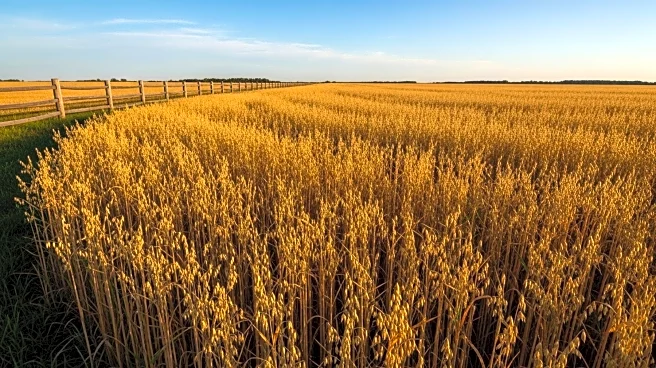What's Happening?
Midwest oat growers are pushing for increased domestic oat production, aiming to reduce reliance on Canadian imports and improve local environmental conditions. Despite the potential benefits, major agricultural companies and commodity groups have not provided significant support, as oats do not require hybrid seeds or extensive fertilizers. Farmers in Iowa and Minnesota are conducting field trials to demonstrate the viability of growing food-grade oats locally. This initiative could save freight costs and avoid tariffs, while also enhancing soil health and water quality. However, the lack of financial incentives from big agricultural players has left oat growers to promote their own cause.
Why It's Important?
The push for domestic oat production is significant for both economic and environmental reasons. Economically, it could reduce costs associated with importing oats from Canada and mitigate tariff risks. Environmentally, expanding oat cultivation could improve soil health and water quality, addressing issues caused by the prevalent corn and soybean rotation. This shift could also support sustainable agricultural practices, appealing to consumers increasingly interested in environmentally friendly products. However, without support from major agricultural companies, the expansion faces challenges, as these companies benefit more from corn and soybean production.
What's Next?
Oat growers are awaiting feedback from major buyers like Quaker on the quality of domestically produced oats. Meanwhile, efforts are underway to establish a $55 million oat-processing plant in Minnesota, which aims to process 3 million bushels of oats annually. This facility could provide a premium market for local oat farmers, encouraging more to adopt oat cultivation. Additionally, partnerships like the one between PepsiCo and Cargill to promote regenerative farming practices may influence future agricultural priorities, potentially increasing support for oats and other sustainable crops.
Beyond the Headlines
The movement towards increased oat production highlights broader trends in consumer preferences and agricultural practices. As consumers demand more sustainable products, companies may need to adjust sourcing strategies to align with these values. This shift could lead to long-term changes in agricultural priorities, promoting crops that offer environmental benefits alongside economic viability. The success of oat growers in the Midwest could serve as a model for other regions seeking to diversify crop production and improve sustainability.










